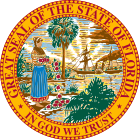| Governor of Florida | |
|---|---|
 Seal of the State of Florida | |
 Flag of the State of Florida | |
since January 8, 2019 | |
| Executive branch of the Florida government | |
| Style |
|
| Type | |
| Residence | Florida Governor's Mansion |
| Seat | Tallahassee, Florida |
| Appointer | Popular vote |
| Term length | Four years, renewable once consecutively |
| Constituting instrument | Constitution of Florida |
| Precursor | Governor of the Florida Territory |
| Formation | June 25, 1845 |
| First holder | William Dunn Moseley |
| Deputy | Lieutenant Governor of Florida |
| Salary | $134,181 (2023)[1] |
| Website | flgov.com |
 |
|---|
The governor of Florida is the head of government of the U.S. state of Florida. The governor is the head of the executive branch of the government of Florida and is the commander-in-chief of the Florida National Guard.[2]
Established in the Constitution of Florida, the governor's responsibilities include ensuring the enforcement of state laws, the power to either approve or veto bills passed by the Florida Legislature,[3] overseeing state agencies, issuing executive orders, proposing and overseeing the state budget, and making key appointments to state offices. The governor also has the power to call special sessions of the legislature[4] and grant pardons, except in cases of impeachment.[5]
When Florida was first acquired by the United States, future president Andrew Jackson served as its military governor. Florida Territory was established in 1822 and five people served as governor over 6 distinct terms. The first territorial governor, William Pope Duval, served 12 years, the longest of any Florida governor to date.
Since statehood in 1845, there have been 45 people who have served as governor, one of whom served two distinct terms. Four state governors have served two full four-year terms: William D. Bloxham, in two stints, as well as Reubin Askew, Jeb Bush and Rick Scott who each served their terms consecutively. Bob Graham almost served two full terms but resigned with three days left in his term in order to take a seat in the United States Senate.[6] The shortest term in office belongs to Wayne Mixson, who served three days following Graham's resignation.
The current officeholder is Ron DeSantis, a member of the Republican Party who took office on January 8, 2019.
- ^ "Salary charts for statewide elected officials" (PDF). New York State Commission on Legislative, Judicial, & Executive Compensation. June 27, 2024. Retrieved December 12, 2024.
- ^ FL Const. art. IV, § 1a
- ^ FL Const. art. III, § 8
- ^ FL Const. art. III, § 3c
- ^ FL Const. art. IV, § 8
- ^ "Mixson To Be Governor for 3 Days; Graham Will Quit Early so He Can Run for U.S. Senate Seat". Orlando Sentinel. July 10, 1986. Retrieved January 6, 2025.

